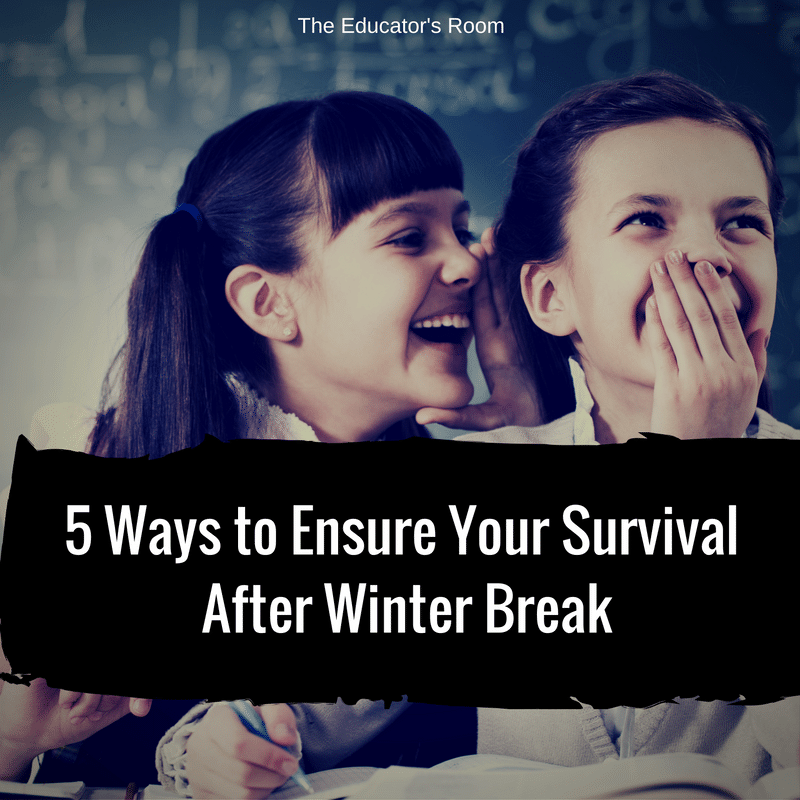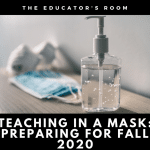People say that teachers have it easy because of all the breaks we get, but the truth is that we often spend at least part of our breaks catching up on grading, lesson plans, and paperwork. Before you know it, after some time with the family or with friends, drinking egg nog, and eating pie, the break has ended. Suddenly, you’re two days away from break ending and you’re panicking. For whatever reason, it seems that the times after long breaks are especially challenging. So what can you do to survive the transition back to school after winter break?
Surviving After Winter Break
Why does coming back from a long break feel like starting over? Because it is kind of like starting over. After more than a week off, there are several things you can do to get the kids back on track, but first remember that coming back is kind of like the first day of school, so you’re going to have to treat it as such in many ways. So, here are some tips…
Begin with a Bonding Activity
I know it sounds cheesy, but the students have just come back from a break and all they really want to do is talk to each other. While it seems natural to assume they saw each other over the break, many of them may only have contact with their friends during school hours. Why not make it easier by allotting a certain amount of time for a strictly social activity.
You can gear it toward whatever you’re working on. In Language Arts, a writing prompt that they then share with one or two classmates on what they did over the break would work. In math, have them making a pie chart or a graph indicating the number of hours (or percent of time) they spent doing various activities. So what if one of them puts “sleep” as 80%–I guess they’re well-rested then, right? Whatever your topic, integrating social activities is a good way to establish a positive learning environment, which is crucial to learning.
Remind Students of Classroom Expectations
You do not have to spend this time lecturing the students. You can just have students volunteer briefly to explain one of the classroom expectations each and what it looks like. When transitioning through activities during the day, remind students of how they are expected to transition since transitions create the most potential for behavior problems when left unchecked.
Keep Expectations High
Learning doesn’t stop just because students just came back from a break. Put aside time for bonding and expectations, but keep the rest of the classroom routine rigorous so that students are not bored and left to their own devices. They say that idle hands are the devil’s playground, and whether you’re religious or not, you can probably appreciate the meaning behind the phrase.
[bctt tweet=”Learning doesn’t stop just because students just came back from a break.” username=”EducatorsRoom”]
Remain Flexible and Creative
Keeping students busy does not mean giving them busy work. If you want to establish rigor, students need activities that make them think and stimulate multiple intelligences. Like “These dollar BILLS are MINE” for Bodily/Kinesthetic, Interpersonal, Linguistic, Logical-Mathematical, Spatial/Visual, Musical, Intrapersonal, Naturalistic, and Existential. To determine what your students prefer, ask them to complete a survey like this one and then try incorporating these intelligences into lesson plans. Pinterest becomes a fantastic resource when it comes to looking for differentiated lessons.
Remember to Breathe
Do what you need to do to relax during the day. That said, remember that just as much as you likely wished you had more time on break, the students, for the most part, probably felt the same way. Take deep breaths or find whatever relaxation technique you need to stay calm and maintain healthy interactions with students.
[bctt tweet=”You CAN survive after winter break! 5 Tips for Teachers!” username=”EducatorsRoom”]
Most of All, Remember You’re Almost Done!
At this point, you’re halfway through the school year. After winter break, your focus is on finishing up with your curriculum guidelines and then reviewing for any state assessments or final exams. If you maintain good classroom management and differentiate appropriately for students while also trying to have a little fun and laugh with them, you’ll do a great job!
How do you survive coming back after winter break? Put your suggestions in the comments!







